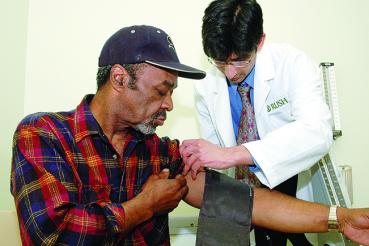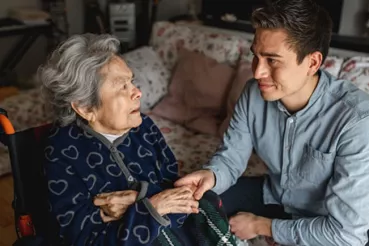The endocrine system is an amazing thing. It's the extensive network of glands that produce the hormones we need to regulate metabolism, sexual function, growth, mood and more.
As we move through the stages of life, our hormone levels fluctuate; aging means that we produce more of some hormones and less of others (mostly the latter).
These are some of the hormonal changes people can experience as they get older:
For women: menopause
The most common consequence of aging-related hormonal changes is menopause. Around age 50, women's ovaries begin producing decreasing amounts of estrogen and progesterone; the pituitary gland tries to compensate by producing more follicle stimulating hormone (FSH).
While menopause is normal and happens to all women, some of the symptoms can be irritating or even dangerous. Symptoms might include the following:
- Hot flashes
- Vaginal dryness and atrophy leading to painful intercourse
- Decreased libido
- Insomnia
- Irritability/depression
- Osteoporosis that can increase the likelihood of bone fractures
Help with symptoms: For many years, physicians prescribed long-term use of an oral estrogen/progesterone combination to alleviate these symptoms. But a study in the early 2000s revealed that those taking hormone replacement therapy had a higher risk of stroke, cardiovascular disease, breast cancer and blood clots.
Current guidelines indicate that it's okay to take estrogen and progesterone for a short time to help with the transition to menopause — and there are ongoing studies investigating the efficacy and safety of different estrogen and progesterone formulations that could potentially be used for longer periods of time.
Alternative therapies, such as bioidentical hormones made from plant or animal sources, haven't yet been thoroughly evaluated for safety and effectiveness.
So for now, try the following:
- Non-hormonal medications can treat hot flashes
- Topical estrogen cream used vaginally can help with painful intercourse.
- Leading a healthy lifestyle that incorporates a balanced diet, regular physical activity and stress management helps alleviate many symptoms of menopause.
It's also important for all women to have regular bone-density screenings beginning at age 65 to catch osteoporosis early.
Current guidelines indicate that it's okay to take estrogen and progesterone for a short time to help with the transition to menopause.
For men: andropause
It's not "male menopause," exactly — for one thing, it doesn't happen to all men — but about 20 percent of men over age 60 and 30-50 percent of men over age 80 will experience andropause, a significant decline in testosterone production.
The symptoms might include the following:
- Decrease in muscle mass and overall strength
- Decrease in bone mineral density and a corresponding increased risk of osteoporosis
- Low libido and erectile dysfunction
- Decreased energy and depression
- Cognitive impairment
Men experiencing any of these symptoms should ask their primary care physicians or geriatricians about having testosterone levels tested (and all men should start bone-density tests at age 70).
Help with symptoms: If levels are low and symptoms are present, testosterone replacement might be an option — but there can be risks associated with testosterone replacement and therapy must be customized.
Testosterone will cause existing prostate cancer to grow, and might pose an increased risk of cardiovascular disease; it also makes sleep apnea worse and can cause overproduction of red blood cells, which increases the risk of blood clots.
Being treated with testosterone means that you need regular prostate exams as well as frequent monitoring of your prostate-specific antigen (PSA) levels and hematocrit.
A healthy lifestyle with regular exercise and a balanced diet can be just as helpful in fighting symptoms of andropause as they are for menopause. You have to work a little, and there's no magic bullet. But simple changes can help with almost every symptom.
For everyone: thyroid hormones
It can be easy to chalk up changes in mood, weight and menstrual patterns to the normal hormonal fluctuations of aging, but they can also be the result of thyroid disease, which affects 30 million Americans of all ages.
The thyroid, a small, butterfly-shaped gland located at the front of the neck, produces hormones that control the rate of processes like metabolism, body temperature and muscle strength.
Learn which symptoms may indicate a thyroid condition.
Physicians differ on the age at which physical exams should begin including checks of thyroid stimulating hormone (TSH), but they recommend a simple blood test for everyone over 60 or anyone with symptoms of thyroid disease. If needed, treatments for underactive or overactive thyroid are generally very well tolerated.
Prevention is the best medicine
At this point, doctors don't really know whether the physiologic decline in hormones with aging is normal and healthy, or whether it should be treated. With a number of ongoing large-scale studies underway, there's new data emerging all the time about whether and how to supplement hormones.
In the meantime, it's essential to talk with your primary care doctor about treating any symptoms you experience — and just as important to prevent or manage symptoms by taking good care of yourself.




